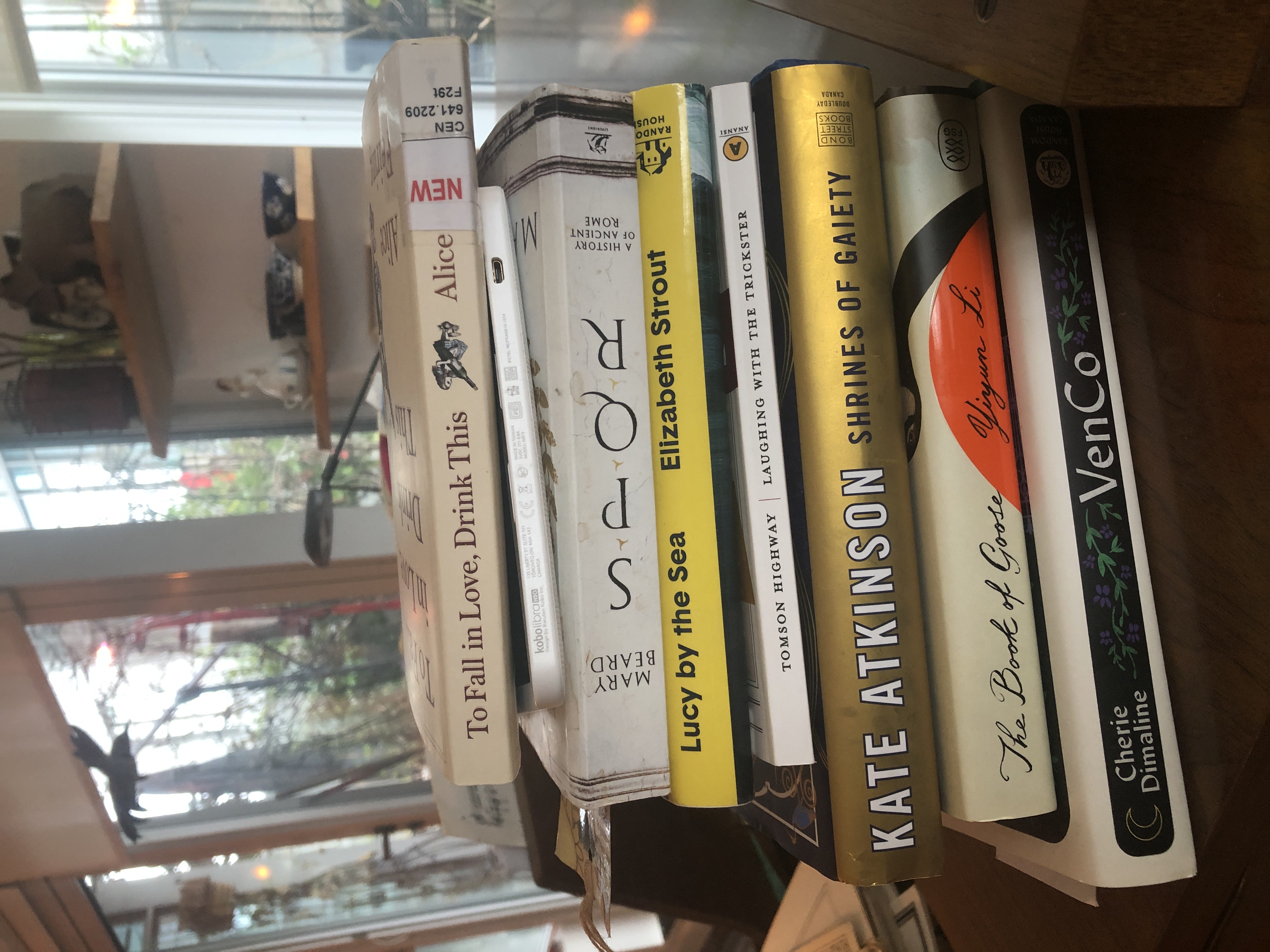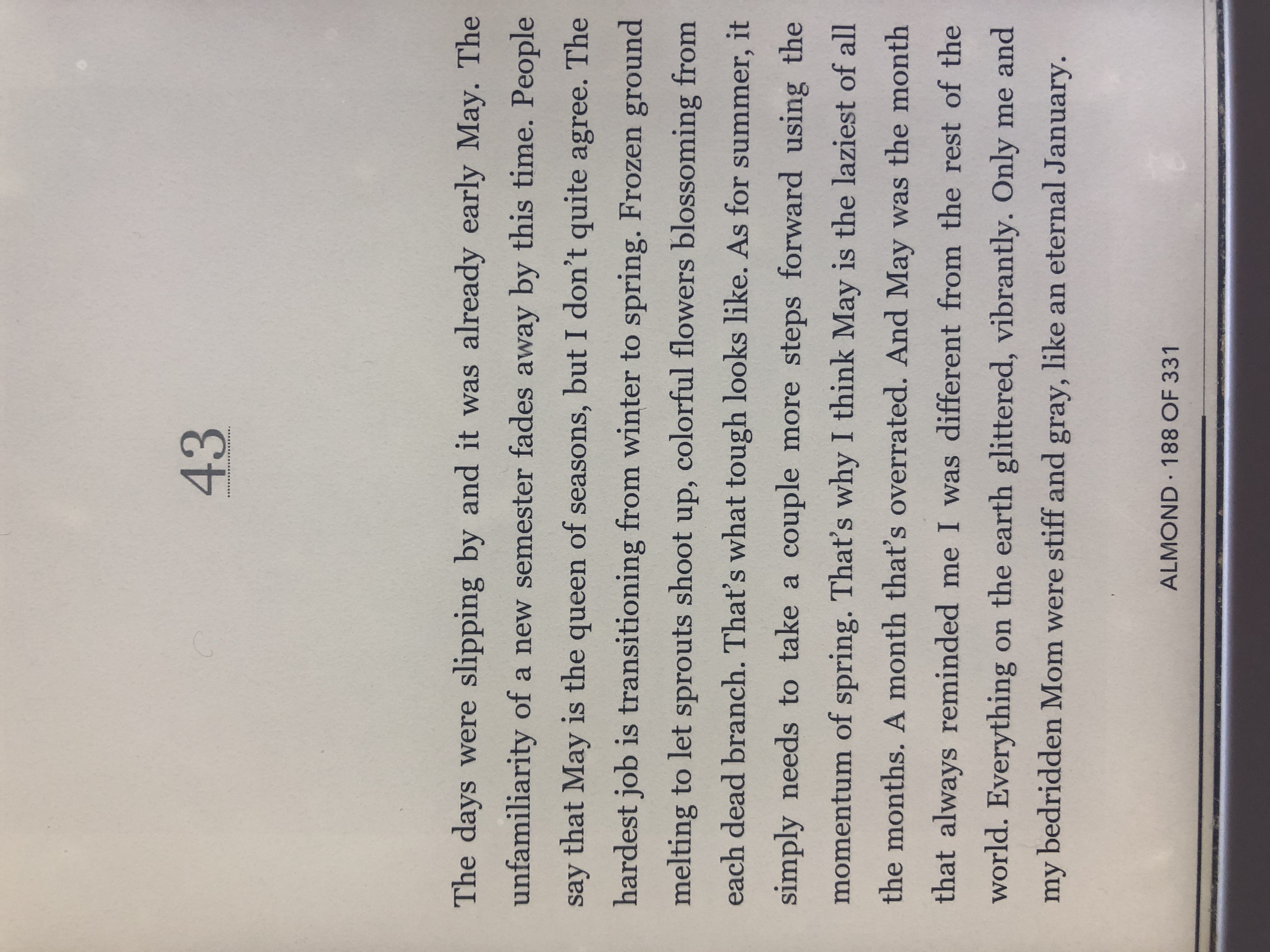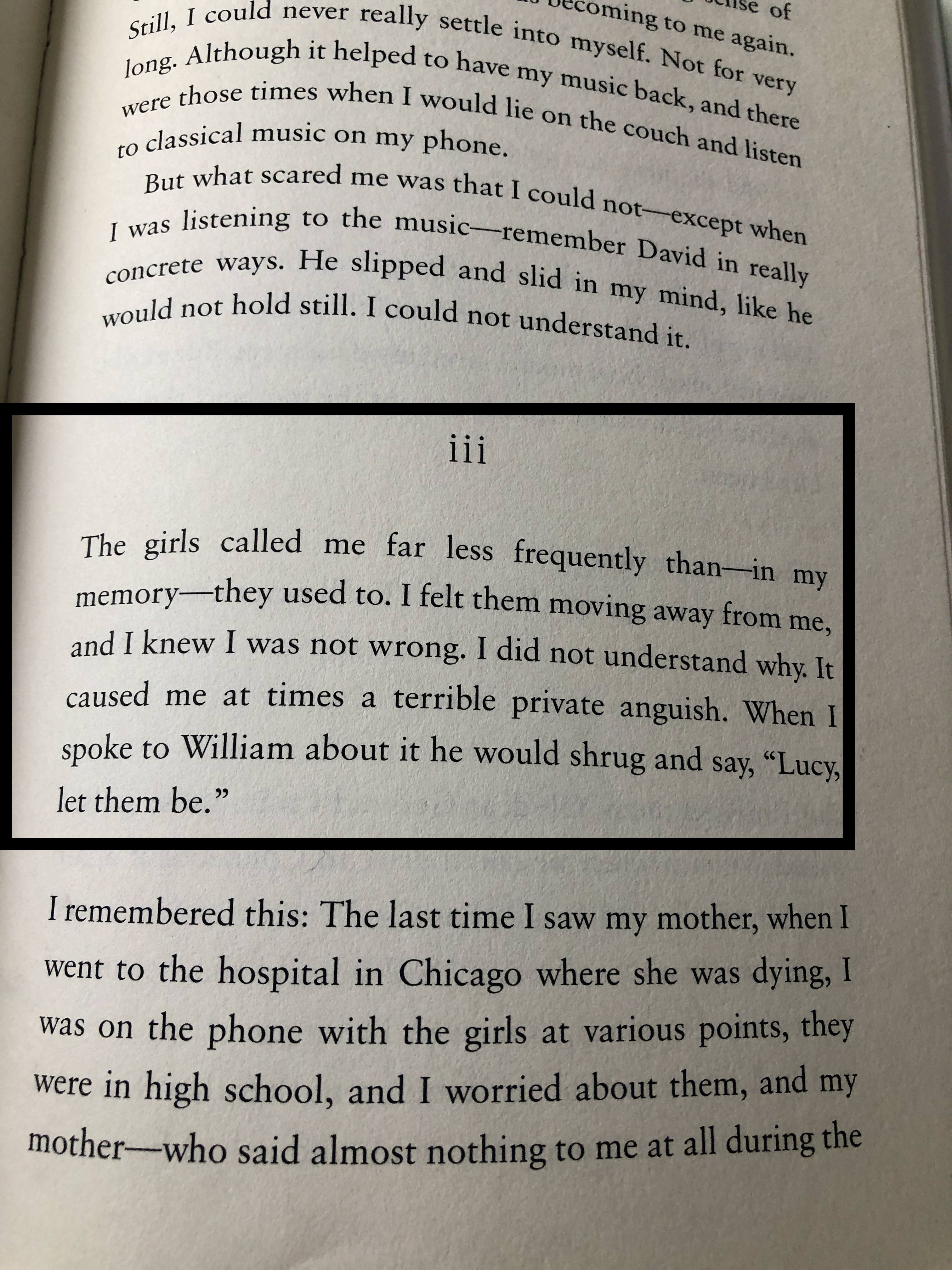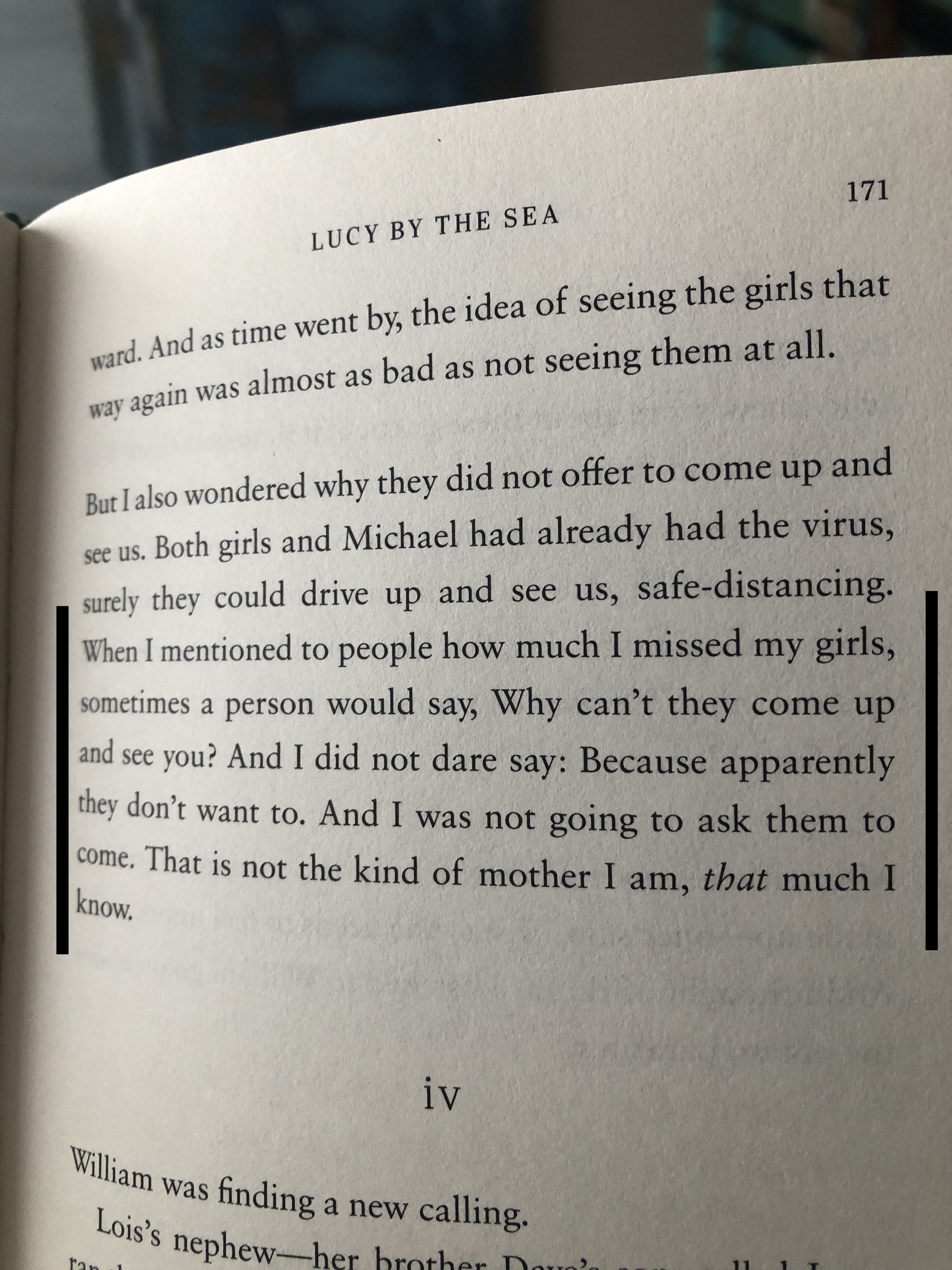
March mixed it up with a little bit of lion and a little bit of lamb scattered throughout the month. But I can tell you that as far as my reading went, March came in with a Korean coming-of age novel and went out jostling a collection of essays and an Italian mystery.
For those who are new here and as a reminder to regular readers: As usual, the numbering comes from my annual reading journal, and the italicized text below is directly transcribed from that journal’s pages (once upon a time, I simply included photographs of those pages, but too many of you found my handwriting tough to decipher, especially in the photographed format). I’ve used regular font for any additions to my journal notes and included references to any posts from my Instagram Reading account.”
15. Almond. Sohn Won-pyung. Trans. Sandy Joosun Lee. Domestic fiction; bildungsroman/coming-of-age novel; disability; Korean writer; Literature in translation.
Another book recommended by my daughter in Rome; lucky me!
Yunjae lives with his mother and grandmother in an apartment that also houses his mother’s secondhand bookstore. He has under-developed amygdalae which makes it difficult for him to experience emotions — and both his mother and his grandmother work with him daily so that he might learn to react appropriately to everyday situations.
His voice, despite his disability, is thoughtful, analytical, and surprisingly astute, even wise. I don’t know enough about this condition to comment confidently, but I’m not sure the author’s transformation of Yunjae in the second half of the book (after he suffers a tragic loss) is any less magical thinking than Yunjae’s mother’s hope that eating almonds will stimulate the development of his brain. But Yunjae develops positive and nurturing friendships (an older man who is a beneficent presence on behalf of the boy’s mother; a classmate whose tough childhood causes him to act out but who nonetheless has a close bond with Yunjae; and even a promising romance with a would-be track star). Challenges and danger and a twist or two for a very satisfying — if not entirely credible — ending. Despite my reservations, I’ve already recommended the book to a few readers, and I suspect you’d find much to like in it as well.
And although we’ve only just inched into April, I’ll leave you with this passage about May to contemplate and to gather a quick impression of the novel’s flavour.

16. Shrines of Gaiety. Kate Atkinson. Literary fiction; Historical fiction; Strong female characters; demi-monde London “between the wars.”
Trademark Atkinson and well worth the price of the hardcover copy I bought myself when Paul and I did our pre-Christmas shopping at a favourite independent bookstore.
The setting: 1926 London, recovering slowly after the huge losses of men during WWI, but more specifically, the night life taking place at those “shrines of gaiety,” night clubs that yielded access to booze, drugs, and prostitution, all facilitated by “coppers on the take.”
I loved the strong female characters: Gwendolen,a librarian looking for adventure after her mother’s death and the subsequent discovery of a substantial inheritance left in trust for her by her father; night club owner Nellie Cohen, just out of a 6-month stretch in Holloway Prison for Women. Nellie’s a formidable woman, a matriarch who has two of her daughters educated at Oxbridge after public school, hoping to ensure they marry money and/or nobility. All her daughters (she has a large brood!) are feisty and entertaining in their own way.
There’s also a girl in her mid-teens, Freda, who’s made her way to London with aspirations of stardom on the stage . . . Here’s an excerpt that gives you a flavour of the narrator’s sly humour and a sense of Freda’s impending vulnerability in the big city:
Freda had . . . a good idea of where London was on the map. She was already dreaming about living amongst its pleasure palaces. ‘Dens of iniquity,’ Adele said. Freda had no idea what that meant but she thought that it sounded entrancing.
Duncan . . . was currently serving two years’ hard labour in Armley Gaol for gross indecency. ‘You don’t want to know what that is,’ Adele said and then told her anyway. Freda had the great gift of rarely being surprised.
Shrines of Gaiety, p. 36
And another excerpt that I was delighted to find, Gwendolen’s thoughts echoing something I’ve often remarked:
‘Gossip,’ Mr. Pollock called it dismissively, but Gwendolen thought that was the word men gave to women’s conversation. Men talked in order to convey information or to ruminate on cricket scores and campaign statistics. Women, on the other hand, talked in an effort to understand the foibles of human behaviour. If men were to ‘gossip,’ the world might be a better place. There would certainly be fewer wars.
Shrines of Gaiety. p. 50
The paragraphs following this excerpt are equally satisfying in their commentary on a “rather heated discussion” on library acquisitions, with Gwendolen arguing against censorship, willing to advocate even for writing she disliked. Her position was that “the Library [ought] not to be out of step with modern times,” and she challenged her boss on whether it was “really their job to decide what people could or could not read?” You’re all applauding with me, right? And wanting to get your hands on a copy as soon as possible! Highly recommended, this one!
My Instagram post on this gem — where a number of readers chimed in.
17. Lucy by the Sea. Elizabeth Strout. Literary fiction; Lucy Barton series; Pandemic fiction; Women’s lives; Marriage; Motherhood.
After having taken a road trip with her eponymous ex-husband in Oh William (in the wake of her 2nd husband’s death), Lucy finds herself swept up in his conviction that they and their loved ones need to get out of New York City to somewhere they can isolate themselves from a virus Lucy herself can’t take seriously. I’ve read a few novels (mostly mysteries) that incorporate the pandemic, but Strout’s exploration through the observant and thoughtful Lucy is the closest I’ve read to my experience of the pace and the strangeness and the isolation of those first 6-8 months. She also gets at the nascent politics of that period — also with an eye to nuance. And the way relationships changed and deepened (or foundered) in the proximity and the distancing of enforced isolation.
She captures the way our age suddenly became a factor in our identity in a way it hadn’t when medicine seemed more certain.
And oh, Lucy on her relationship with her daughters (and posthumously with her own “real mother” — so damaged and damaging, as well as with the Good Mother she creates for herself). She has two adult daughters (no grandchildren yet) and I have three (with grandkids adding another dimension) — but Lucy’s intuition and self-reflexivity and unfliching perception yield observations I kept nodding to, exclaiming “Yes!” under my breath.


I hasten to affirm my ongoing good relationship with my daughters (and so, I suspect, would Lucy) But I can admit to instantly recognizing what Lucy feels here, and it’s a relief to do so. I think many readers of the Lucy Barton novels will have felt this same relief at various points, grateful for Strout/Lucy’s ability to articulate uncomfortable truths and thus make them less uncomfortable, less shameful even.
So much here in an apparently slight novel — she’s done it again!
My Instagram post about Lucy by the Sea — again, many comments by others who loved the book.
18. To Fall in Love, Drink This: A Wine Writer’s Memoir. Alice Feiring. Memoir; Women’s Lives; Wine; New York City.
I wrote this in my Instagram post, and I think it will suffice here (I copied the IG post verbatim into my handwritten Reading Journal). “So glad a blog reader recommended this rich memoir (and grateful that VPL got me a copy so quickly . . . the memoir traces the life of a woman of similar vintage albeit different “terroir” to my own — born in the ’50s, coming-of-age in early ’70s, so much social change through the last half of the 20th century. Feiring writes entertainingly and poignantly about growing up in New York, about her Yiddish-speaking grandfather, her feisty, sweet wine-preferring mother, her philandering father, her beloved and trusted older brother.
Each essay / chapter is organized around a particular bottle, but goes beyond that specific wine to a grape or a place or a memory. Known as a — perhaps as “the” — champion of the organic or natural wines that are currentrly changing the wine scene, Feiring writes poetically and/yet convincingly about wine. Through the stories of each wine she tells her own. You’ll want to drink a different glass with each chapter. Cin-cin!”
Didn’t mention this on IG, but the harrowing encounter she has as a teen with a predatory older male is chilling — especially when she recognizes his face in the news decades later. Reminded me of a chapter in Maggie O’Farrell’s memoir I Am, I Am: Seventeen Brushes with Death, which I wrote about here.
19. VenCo. Cherie Dimaline. Fantasy; Thriller; Feminist Critique; Contemporary Witches; Strong Female Protagonists; Métis writer.
Contemporary witches against the patriarchy — but it’s a race against the clock as well, with little time left for the sixth and seventh witches to find the talismans that will alert them to their power and bring that power to complete the coven.
Dimaline does it again with engaging characters, a taut storyline, and rich world-building — the history of persecution that culminated in Salem’s witch-burning is traced back through Europe, the Inquisition and beyond, the arcane and the apocryphal and a big dose of fantasy mixing it up with conventional historical knowledge in a magically convincing blend.
Especially attractive is the relationship between the women of VenCo, their diversity, and their general respect for a feisty elder who comes along with her granddaughter for the road trip. . . One of those page-turners that slow you down the last forty pages or so because you don’t want it to end, even as you’re anxious to find out how it will. . .
The mix of feminist (and anti-racist) critique with fantasy in a contemporary world of corporate capitalism reminded me of Zakiya Dalila Harris’ The Other Black Girl, which I wrote about in an earlier post.
20. Laughing with the Trickster: On Sex, Death, and Accordions. Tomson Highway. CBC Massy lectures; lectures/essays; Indigenous writer; Cree writer; Language; Comparative Mythology; Comparative Religious Study; Humour; Sex and Gender.
So much wisdom, so much gorgeous description of a childhood in the far North, so much humour — all brought to bear on thinking through the similarities and differences between Christian, classical, and Cree mythologies.
Read this collection! I highly recommend it for entertainment and rich food for thought. But also, if possible, listen to the lectures as well. And if you’re captivated by Highway’s voice and his story-telling, you’ll want to read his memoir, which I wrote about here.
21. Era di Maggio. Antonio Manzini. Read in Italian; Available in English as Spring Cleaning; Mystery; Police Procedural; Rocco Schiavone series; Set in Italy’s Valle d’Aosta and in Rome.
The fourth book in the Rocco Schiavone series, and the transplanted Roman is devastated by the murder of his best friend’s girlfriend for which he feels partially responsible. But as devastated as he is, he can’t help responding to the transformation May is bringing to the Valle d’Aosta after his introductory months there in the very cold, very snowy winter (which has cost him many pairs of his beloved Clarks).
Cases that were thought to be solved by the end of Book 3 prove to have roots difficult to untangle, and Rocco is somewhat distracted by the need to find the murderer of his friend’s girlfriend. Meanwhile, he’s adopted an abandoned dog (a rare Saint-Rhémy-en-Ardennes), Lupa, and he’s learning that he has a growing community of friends and appreciative, supportive colleagues. So appreciative and attentive to Rocco’s foibles that when he returns to the office after taking some time to grieve, he finds that his colleagues have posted a mural at the questura, a mural which sets out the 10 levels of things that, according to Vicequestore Rocco, qualify as “le rotture di coglioni.” (In English, we might say “pain in the ass;” the Italian invokes specifically masculine anatomy. . . “the breaking of balls.” )
I’ve so enjoyed watching the development of this character (I wrote about the first book in the series, Pista Nera here), and seeing that his rude chauvinism and his often ungracious treatment of those who answer to him is more a deflection of his grief over the loss of his wife (of which loss we finally learn the details by the end of this volume) than a reflection of his true personality. His tendency to ignore inconvenient procedural expectations and legal niceties almost certainly preceded his bereavement. . .
That’s it for my March reading. I’m currently making sure I’ve downloaded enough airplane reading onto my Kobo. Today’s list also includes last-minute adjustments to packing (I bought packable rain pants yesterday, just in case. If having bought them ensures I won’t have to use them, they’ll be worth the space in my carry-on!) and a visit from my teen-aged g’daughter to begin watching Buffy the Vampire Slayer together. Oh, I’ve waited for this moment. . . .
The next time I post, it will be from Italy. Meanwhile, although I may not find time to respond to your comments, know that I will be reading them and savouring all the book-ish conversation. What have you been reading; what do you recommend; have you read the books in this post and do you agree or disagree with my response? Or throw in your own question of other readers here . . . all grist for the mill. Let the Book Chat begin!
I have thoroughly enjoyed every book I bought from your recommendations! And two here really call-out to me. Thank you for richly expanding my reading beyond monthly “book club” suggestions.
Enjoy Italy… as if that needs saying. XO
I’m interested in Antonio Manzini but a quick look online tells me to be sensible and buy these on site OR break down and start reading on an electronic device. Hmm…decisions, decisions.
I hope your rain pants work as a charm against bad weather. I’m so eager to hear about it all…just reading ‘next time I post, it will be from Italy’ gives me a thrill.
Have happy and safe travels! (I wonder how many pages you will be able to read at night after a hard day’s walk…I will wager three but you won’t remember the last two…) 🙂
I also read Lucy By the Sea in March and enjoyed it very much! She really did capture the strangeness of the early days of the pandemic.
Enjoy Italy and especially the long walk! I look forward to reading all about it.
Thank you for your always interesting book reviews. I am currently reading Dinners with Ruth by Nina Totenberg about Ruth Ginsberg and their long friendship. Many surprises here. To be read: Fresh Water for Flowers by Valerie Perrin, translated from French. Apparently a no. 1 best seller in France and Italy. Looking forward to it. Wishing you a wonderful trip!
I recently had the pleasure of reading both Lucy By the Sea as well as Shrines of Gaiety. During the last month I read The Curious Charms of Arthur Pepper by Phaedra Patrick. A 69 year old widower discovers his late wife may not have been the person he thought she was. He sets out to find out more about her and discovers so much about himself. Often whimsical and amusing it was a nice change from some of the darker novels I had been reading. Next up were two crime novels written by two of my favorite authors of the genre. First was an older title, Faithful Place by Tana French. A Dublin policeman is drawn back to the disfunctional family and decaying neighborhood he left years ago when the remains of his former girlfriend are discovered in an abandoned building. Then came Exiles by Jane Harper. Set in Australia, Arron Falk, our protagonist is asked to be the godfather to the young son of his best friend and former college in the Melbourne police force. He anticipates a pleasant time in the country’s wine growing region but becomes involved in an unsolved mystery involving the death of a young woman family member. It was coincidental that there we so many similarities with the two books, Both of the main characters had personal connections with the murders and each was as much about relationships and family dynamics as it was about the who done it aspect.
Finally there was The Phone Booth At the End Of the World by Italian writer Laura Imal Messina and translated from the Italian by Lucy Rand. It is about loss, grief, love and hope. A short and spare book, beautifully written It actually takes place in Japan in the years following the tsunami which killed so many people. Highly recommended, and I can see you reading this in the original Italian.
Have a wonderful time on your journey.
I have problems with my tablet,so I’m late for the party!
But,I assume that you are in Italy,enjoying the holidays,so it is not important at all!
Buona Pasqua!
I’ve read Lucy by the Sea and want to read everything else from your March list!
Some of my March books:
Louise Kennedy’s realistic novel Trespasses (“….and forgive us our trespasses as we forgive those who trespass against us….”) is a poignant love story between a young Catholic woman and an older,married Protestant man amid the Troubles in Northern Ireland,a love affair that could be fatal in more than one way. It is a dangerous passion and lives,families,community,work,status…. are at the stake…..There is something about this book,the atmosphere, that reminds me of The Milkman,but in a way as like Through The Looking Glass,upside down.
I’ve read Amor Towles’ The Lincoln Highway- the 10 day journey (with many unexpected turns )of Emmett, his 8 years old brother and Emmett’s two friends from the work farm. Such interesting characters with different voices-excellent book
I’ve enjoyed Dervla McTiernan’s Ruin,The Scholar and The Murder Rule-I want more…how fast could she write?
Newest Donna Leon So Shall You Reap,newest Liane Moriarty Apples Never Fall as well as Robert Bryndza’s Nine Elms and Claire Douglas’ The Couple At No 9 (two new mystery authors to me)
And than there was Andelka Kliment with her cozy mystery,debut novel, Murder On the River Mreznica! It happens in and all around Zagreb (many of my favourite,well known, places) and its surroundings, short but very well written novel with credible main characters: retired forensic Irma Steeg and inspector Borna Herman. The best fact is that Ms Kliment is retired ,73 years old English teacher. I have high hopes for her and can’t wait her next books,hopefully much longer than the first one.
Dottoressa
I want to read them all!
I’m so glad that you enjoyed To Fall in Love, Drink This. I’ve purchased some copies to give as gifts and I’m excited to hear the recipients’ reactions.
I added VenCo to my wish list on Audible. I like a good book about witches. Here are a couple that I’ve listened to and enjoyed: The Once and Future Witches and A Discovery of Witches (a triology).
While not about witches, but about people with magic, I just listened to Keeper of Enchanted Rooms and found it charming and fun.
On to food-related themes, I recommend Consider the Oyster.
Sorry for not giving authors. I am sure that you will easily find them. I’ve had a long day and your book reviews were just what I needed to unwind.
I hope that you are having a wonderful time in Italy.